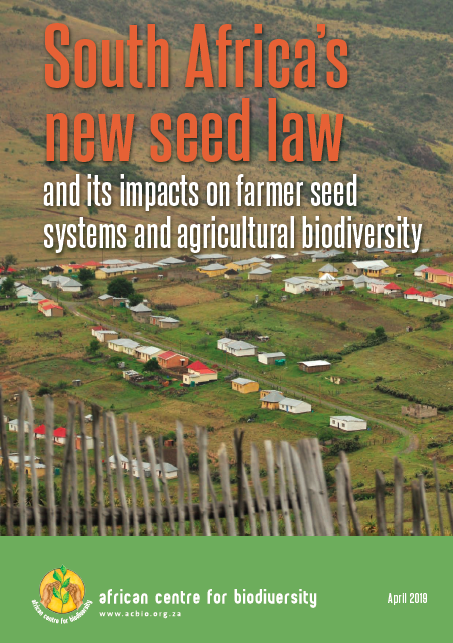Latest Resources

30 April 2019
Oxitec’s failed GM mosquito releases worldwide: Forewarnings for Africa and the Target Malaria pr...
A decade ago, genetically modified (GM) mosquitoes were first released globally, in the Cayman Islands, by UK-based company Oxitec. Further releases followed in Malaysia, Panama and Brazil. In a public relations whitewash, Oxitec has repeatedly claimed that the experiments successfully wiped out nearly 90% of the Aedes aegypti mosquito population, which is one of the […]

26 April 2019
Undermining farmers’ rights and seed systems: Why the EAC seed and plant varieties bill must be d...
In this vlog, African Centre for Biodiversity’s (ACB’s) Sabrina Masinjila, based in Tanzania, speaks about the East African Community Seed and Plant Varieties Bill, 2018 and some of the concerns related to the Bill, as more fully set out in a detailed report and summary. As described in the vlog and our detailed report, Concerns […]

23 April 2019
South Africa’s new Plant Breeders’ Rights Act and its effect on farmers’ rights and farmer manage...
In this updated briefing, the African Centre for Biodiversity (ACB) warns that the Plant Breeder’s Rights Act (PBR) 2018 will impact negatively on small-scale farmers and calls for exemptions in the Regulations to protect farmers’ rights. The PBR, together with the new Plant Improvement Act (PIA) 2018, was approved by Parliament last October and has […]

23 April 2019
South Africa’s new seed law and its impacts on farmer seed systems and agricultural biodiversity
In this updated briefing, the African Centre for Biodiversity (ACB) reflects on how the new Plant Improvement Act (PIA) 2018 will further undermine the rights of small-scale farmers while expanding the rights of the corporate agricultural sector, further entrenching its domination. The PIA, together with the new Plant Breeder’s Rights Act (PBR) 2018, was approved […]

16 April 2019
Agroecology as an alternative (Video four of a four-part series)
In August 2018, the Rural Women’s Assembly (RWA) and the African Centre for Biodiversity (ACB) hosted a speak-out for SADC smallholder farmers in Windhoek, Namibia, on Farm Input Subsidy Programmes (FISPs). FISPs are government agricultural programmes that promote Green Revolution inputs produced by multinational corporations, such as chemical fertilizers. In Ghana, for example, up to […]

8 April 2019
Production quality controls in farmer seed systems in Africa
This ACB report explores issues relating to farmers’ independent seed development, production and distribution. Drawing from innovative case studies in Brazil, East Africa and elsewhere, suggestions are presented to strengthen farmer quality control practices. In sub-Saharan Africa, more than 65% of the population depends on agriculture for their livelihoods, producing around 80% of food consumed. […]

20 March 2019
Alternatives to FISP: Farm Input Subsidy Programmes in Africa
In August 2018, the Rural Women’s Assembly (RWA) and the African Centre for Biodiversity (ACB) hosted a speak-out for SADC smallholder farmers in Windhoek, Namibia, on Farm Input Subsidy Programmes (FISPs). FISPs are government agricultural programmes that promote the use of Green Revolution inputs produced by multinational corporations. These top-down packages have proven to be […]

13 March 2019
Experiences of FISP: Farm Input Subsidy Programmes in Africa
In August 2018, the Rural Women’s Assembly (RWA) and the African Centre for Biodiversity (ACB) hosted a speak-out for SADC smallholder farmers in Windhoek, Namibia, on Farm Input Subsidy Programmes (FISPs). FISPs are government agricultural programmes that promote the use of Green Revolution inputs produced by multinational corporations. Farmers were not properly consulted about their […]

5 March 2019
WHY FARMERS FIND FISP PROBLEMATIC (Part 1 of 4 videos)
In August 2018, The Rural Women’s Assembly (RWA) and the African Centre for Biodiversity (ACB) hosted a speak-out with SADC smallholder farmers in Windhoek, Namibia, on Farm Input Subsidy Programmes (FISPs). FISPs are government agricultural programmes to promote the use of Green Revolution inputs (hybrid seed, synthetic fertilizer and agro-chemicals) produced by multinational corporations. WHY […]

17 October 2018
UPOV 1991 and the ITPGRFA: Key issues for farmer managed seed systems in South Africa
The South African government has called upon stakeholders to submit comments and attend stakeholder meetings on the 23rd and 24th October 2018, on the implications of South Africa acceding to the International Union for the Protection of New Varieties of Plants (UPOV 1991) and the International Treaty on Plant Genetic Resources for Food and Agriculture […]
